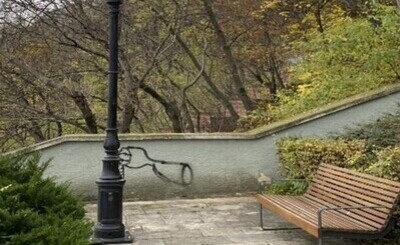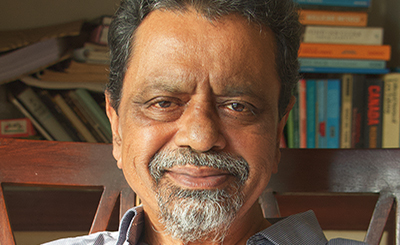
Even when she was getting late for office, Sunanda took the time to carefully balance herself on one dry rubber chappal and hit the switch of the geyser with the other to turn it on when she needed hot water for her bath.
Old habits die hard.
She had grown up in a Government of Uttar Pradesh non-officer-cadre residential quarters in a remote corner of that state. Her father had been an office-attendant-cum-watchman in the Collector’s Office. The tiny two-room apartment which he was allotted was home to her parents, siblings, an orphaned cousin, an unmarried aunt and a flea-infested cur.
The quarters were slime-covered and crumbling. Missing hinges meant window-frames stuck out at weird angles. Cracked panes were the norm.
Inside the bathrooms, damp portions of the walls gave off a mild electric shock every time the one-litre ‘instant’ geyser was switched on. (Electrical geysers had replaced wood/coal outdoor choolhas about thirty years ago when someone made money on the contract to buy them. None had bothered to check how often there would be electricity in those districts. (Ha!) In some quarters, the geyser was perched horizontally above the ‘sink-mirror’. In others, more severe space constraints meant the geyser, rusting and with wiring exposed to the elements, hung precariously outside a window, clinging to a pipe or grill with several rounds of fraying coir rope that was replaced only when it broke in an ‘emergenshy shichuashun’. There were yet other types of quarters that didn’t have individual bathrooms: residents shared, never amicably, one row of toilets and another of bathing-rooms both located a few yards away from the quarters.
Drums for storing rationed water, overflowing sewage, washing hung out to dry on wire fences and liberally strewn garbage marked the neighbourhood.
The fronts of the homes were tidied and swept every morning. Some had a pot or two of either a flowering plant or a ‘tulsi’ on one side. Every entrance had a garland or anadornment across the top part of its frame. Colourful plastic chairs were stacked in the corner of the 3’x5’ verandas of the ground floor ‘flats’. On other storeys, balconies and railings were semi-hidden by drying clothes, old boxes, outgrown shoes, and equipment that lay unused because no one had the time, money or inclination to get it repaired, nor the will to discard it.
Sunanda was in the ninth standard when her father died. The family returned to its roots, to Gaunagar, where they lived off the land. And her father’s meagre pension.
Sunanda, now twenty-three, has been in Goa for the past three years. Before that, she was in Bombay, and even before that in Delhi. A visit to her village by an agent scouting for women security guards changed her life. Sunanda had the athletic build, muscular shoulders and intensity in her expression that the agent was looking for. Her uncles were aghast that she should go to a ‘shehar’, live and work on her own, wear a pant-shirt uniform and carry a baton. She was only nineteen then. The promise of a regular salary helped them change their mind. Today, Sunanda earns twelve thousand rupees a month, more than any man in her village. She works for Rakshak Parivar, a provider of guards to companies, ladies’ hostels, hotels, hospitals, railway stations and for functions.
Once the hot-water trickle from the geyser had filled half the bucket, she repeated the one-leg-rubber-‘chappal’ procedure to switch off the gadget. Her room-mates, Amba from Arunachal and Tarini from Kerala, made fun of this habit of hers, but granted that it was a minor quirk. They had heard from their colleagues how awful it was to share a space with pilfering, lying, ever-boasting or back-stabbing types.
Sunanda took less than thirty minutes to get ready. Whilst combing her hair, she uttered a quick prayer to Maidevi, her family goddess, whose picture was tattooed on the back of her wrist, then ran down to catch the bus to the industrial estate where she worked as a guard in The Sai Fish Products factory, in an industrial estate near Vasco in South Goa.
On her very first day there, about a year ago, she had caught a worker smuggling out two calculators and earned herself the nickname ‘Super-nanda’.
Within three months she was sent for higher training. Unlike some girls who were good at nothing but checking purses, Sunanda could wield a ‘lathi’, tackle ‘goondas’, diffuse simple explosive devices. She understood what ‘security breach’, ‘terror attack’ and ‘alert’ meant. She mastered the art of frisking female guests / customers / passengers. After the course was over, she was posted for two weeks at Culture Place near Dabolim airport. She was the only woman guard there. Culture Place had music programs, art exhibitions, parties, and for all those events, they needed a woman guard — that was Sunanda, who got a higher salary than the men-guards. The latter, all ex-para-military or retired policemen, cribbed bitterly about it in her presence.
Sunanda was valuable because there was a shortage of ‘female-power’. Terror attacks had spread across small-town India, (remember last November’s Tirugadh’s onion-market bombing?). Hotels, malls and cinemas which were earlier content with one or two male guards lounging near entrances, suddenly wanted to screen every visitor, infants included. A female employee or visitor could be searched only by a female security person. Girls who sold cosmetics and folded brasin hosiery shops, or worked in beauty parlours, or packed sticker-‘bindis’ in transparent plastic envelopes changed careers and opted to become guards, for the money was good. But none had Sunanda’s calibre; her bosses noticed that.
She never asked for an easy assignment. Once, for two months, she was taken to Shillong, in the bitterly cold months of December and January. She did not complain. Another time, she was sent to Tambaram, near Chennai, in the midst of a drought. She managed the discomfort of the fourteen-hour shifts. Of course, the overtime money was good. At each of the places, Sunanda had access to a proper toilet, with water, tiles, a door that could be locked. To Sunanda, that was a big deal.
At many entrances, girls — um, sorry, women security guards — did their jobs cursorily. Not Sunanda. Her trainers had recorded that she was good at first-aid, fit, had a quick response to possible threats, was adept with evacuation methods, and had no problems in adjusting to last-minute changes in routines. Her search for a decent toilet led her to make a ‘mental map’ of whichever place she worked in. Childhood memories, tucked away in the sub-conscious, define adult habits. Any teenage girl who has lived through the embarrassment of walking to a shared public toilet, head hanging, shoulders drooping, past a bunch of ogling males will understand.
At the Multi-National Military Machines Fair in February this year, where she’d been sent over a weekend from her present assignment, she discovered that the only toilet accessible to her was on the first floor of a building that took her ten minutes to reach. When she eventually found her way to it, she found it closed; a cleaner had locked it and gone somewhere. Sunanda, who has frisked corporate managers, international conference hostesses and even ministers, protested in a voice that echoed through the fancy stalls. The sophisticated delegates present paid attention to what she was yelling about. Other female staff sided with her, some journalists wrote about it the very same day and the administrators of the event had to take heed. A set of sanitary-porta-cabins was hastily organised; Sunanda became a heroine of sorts amongst her peers.
Sunanda generously shared her knowledge and skills with her room-mates. She taught them to identify trouble-makers and ways to tackle them if the need arose. She told them how she had to grope and touch the private parts of strangers as part of checking. Her mates giggled: what would you find there, they asked. Who knew, she replied, maybe smuggled gold biscuits, or drugs, small pistols or even bombs strapped to thighs. It made them believe she led an exciting life. In reality, day after day, there were no chases, no culprits caught, no bullets fired, not even a petty theft happened. As in the case of all guards, when something went wrong, the world came down upon them, accused them of sloppiness, ineptitude. Some lost their jobs when a criminal escaped, most got away with a reprimand. It was — is — so easy to get complacent when routine was — is — mind-numbingly repetitive.
Yes, Sunanda’s job was boring.
When customers got irritated, she had to keep smiling. The patting was getting mechanical. Not once in the few years that she had worked, had she had an action-packed day. No fire-alarm had gone off. No sick man collapsed. Forget booby traps and stuff, not even a lost child had she had the joy of tracking. Missing mobile-phones, the occasional metal-detector screeching the warning of a belt-buckle, figuring out that the bulge in the bosom was a wallet tucked into a blouse for safety, those were the only hiccups in permanently-ordinary days.
On the day of this story, Sunanda got off the bus at her regular stop and walked fast — her walk was more like a trot — to reach the office well in time to ‘punch in’. She changed from her light cotton salwar-kameez with a floral print into the ash-grey synthetic trouser-blouse combination, put away her pretty strap-sandals and put on her ‘issued’ leather shoes, combed her scanty, unruly hair away from her face and tied it into a stern bun and marched to the door where she would spend at least nine hours of the day.
At The Sai Fish Products factory, besides frisking the exiting female staff after their shift was over and they were leaving the premises, she had to check the credentials of suppliers and their delivery boys, escort exporters who came to visit the directors and owners of the company to the latters’ offices, maintain a register of the parcels that came by courier, examine all boxes that were sealed to make sure they weren’t tampered with, as well as keep an eye on the vehicles parked in the compound. There were by-the-way tasks that were outside the scope of her job as per the contract, but which she had to do from time to time: open the doors of the cars when VIPs came, for example. (In a fish-products factory, even an inspector of septic tanks is a VIP).
A security guard looks forward to his or her tea-break with enthusiasm. A mug of the hot beverage, from Kashmir to Kanyakumari, they say, is what keeps this country together. During that ten-minute break, a guard’s guard is down. Answering Nature’s desperate call is important as is stretching the arms up, swinging the full weight of the body on upped toes, twisting the torso from side to side to stretch the muscles. Relief, that’s what those ten minutes are about.
Sunanda was on her break, must have been around 11:30 am, on her way to the loo to deal with a near-bursting bladder, when she heard a commotion and turned to see what was happening.
She strung the facts together later. At that moment, this is what she saw: a well-dressed ‘madam’ slapping on the cheek of Bahuji, her colleague, known for his courtesy and integrity.
This is what had happened: that ‘madam’, sari-clad, but who spoke with a foreign accent, wanted to attend a conference on Marine Trades that was being held on the fourth floor of the factory. It was for invitees only. Government officials, representatives of various companies that manufactured food-processing equipment, micro-biologists who were experts in perishable food-stuff, ice-factory owners, frozen-storage transporters, bankers who gave loans, advertisers, labour-contractors who supplied porters, handling agents who knew everything about licences and permits, barge-operators, lawyers who only drafted contracts, international currency changers, business journalists were amongst those invited. Casual observers at such events were nil.
The ‘madam’, as Sunanda told her room-mates that evening, earned her meals in an extraordinary way. She read in the newspapers about medical seminars sponsored by pharmaceuticals or other conferences like today’s, where she could get to eat at a fancy buffet. When and if asked for her registration details, she would claim that she’d ‘lost’ her invitation or ‘forgotten’ to bring her ‘identity-card’ or make some other excuse. As long as she got her free meal, she was happy. Criminal, yes, Sunanda thought, but a harmless one.The ‘madam’ had tried all her excuses and pleading with Bahuji, but, an ex-jawan of the Indian Army, he was the ‘duty-is-duty’ kind, not to be taken in by tears or cajoling. Unless his direct superior told him otherwise, he would follow the rules. He did not allow the ‘madam’ to enter as she didn’t have any invitation with her, nor was her name on his list. He certainly didn’t expect her to slap him. For doing his job. He was trained to kill, he was an ex-infantryman who had seen action in Siachen and Nagaland. He was also trained to be disciplined. Under no circumstance would he lose his cool, never raise his hand on a woman. Thus stunned, he didn’t know what to do…
…when ‘Madam’ slapped him again.
That was what Sunanda had seen; she stepped up to intervene. She confronted the woman, stood like a buffer protecting Bahuji and would not budge until her supervisor and manager were called to sort matters out. In the hullabaloo, the ‘madam’ struck out with her purse; the ‘chai’ Sunanda was carrying in a flimsy plastic cup spilt on the uniform she was so proud of. Sunanda, very uncomfortable and desperate to go to the toilet and very, very annoyed that the unreasonable ‘madam’ had spoilt the uniform she took such pains to hand-wash, dry in the shade and keep wrinkle-free, slapped ‘madam’ hard.
Pandemonium reined. The ‘madam’ pulled Sunanda’s hair, Sunanda boxed the ‘madam’s’ face and all the staff present rushed to pull them apart.
The ‘madam’ was made to sit in the lounge and Sunanda was led up to her boss’ cabin. The moment Sunanda reached there, she pleaded with the boss’ secretary to let her use a toilet. The only one on that floor was the boss’ toilet and the secretary, who often had lunch in the staff cafeteria with Sunanda, discreetly broke the rule and let her use it. Emergencies call for humane gestures.
Sunanda was trembling with physical discomfort, rage and fright. She was sure she would lose her job. That was the first time Sunanda had seen a toilet which she had to sit on, not squat over. The tiles had designs; the floor was as clean as a just-scrubbed kitchen platform. The sink was dry, unstained and smelt fragrant with a ceramic liquid-soap dispenser. A far cry from what she had in her own bathroom, where she put the soap in a throwaway, ugly foil-saucer. From the left-tap ran hot water. The napkin was so soft, so absorbent and pretty that she touched, but didn’t use it; instead, she lifted her uniform blouse and used the slip underneath it to wipe her hands.
Sunanda took a deep breath. And another. She closed her eyes and inhaled again. She buried her nose in the napkin and…
“… Sunanda, Sunanda, Sunanda, come out…” the panic in the boss’ secretary’s voice rudely shook her out of her semi-dreamy state. She stepped out very reluctantly. Not just because Sunanda knew she was in trouble for having slapped someone, however much that person might have deserved it, on the job, but because she knew it was highly unlikely that she would ever visit such a bathroom again.
Whilst narrating the episode to Amba and Tarini, she described every detail of that bathroom: the shiny taps, the lacy curtain, the soft glow of the hidden bulbs. “It was worth it,” she blurted out. “Just to be in that place for those few minutes, I would slap that ‘madam’ again. And again. I wish I could turn back the clock and bring the wheels of time to a stop. And never have to step out of a bathroom so lovely. I could have stayed there forever.”
“Cut out the drama,” Amba said, shaking Sunanda roughly.
“When you find yourself a husband, make sure you take a look at the toilet in his house before you say hullo to his folks,” Tarini advised. “Here,” she added, showing her some advertisements in a magazine, of glamorous bathrooms.
“Would you like this one? Or this one? Or this one?”
Sunanda sighed, shook her head, picked up her nightclothes from her shelf, and told them to shut up. “I have to forego a day’s salary for what I did today,” she said sadly. Thanks to her good record, her boss had taken a lenient view of the incident. “I’m most likely going to be posted elsewhere, quite possibly to a private school near Vasco. There is no way I will ever get to see another bathroom like that. Our guard-rooms have toilets that allow me to enter only sideways. Dripping taps make the floor slimy. No windows. The stench I can bear, I’m used to it, but… it’s better than having to slink behind a parked car or a shed, wondering whether anyone’s watching…”
She went into the little bathroom attached to the room she shared with the others to wash her feet, brush her teeth and get ready for bed. The hooks behind the door were dangling, the cobwebs above her head hung loose, the corner drain was clogged, the low-watt bulb covered with grime. Sunanda dreamily looked out of the ventilator’s bars and smiled at the stars. She had seen a beautiful toilet that day, one she would not have believed existed, experienced a thrill, felt an indescribable emotion, perhaps never to be repeated. Sometimes, heaven is found unexpectedly in the most mundane places.
More from The Byword
Comments
*Comments will be moderated











